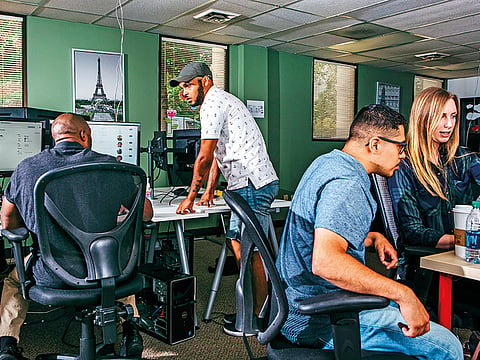Outsourcing cannot be about cutting costs
It requires mix of quality and focussed government services delivered by private players

Also In This Package
With major revenue streams such as hospitality, tourism and oil affected, the critical services of the public sector are fundamental to enable the UAE economy to grow again. Operating those services in a manner that is customer-focused and flexible is essential to reduce burdensome costs and to stimulate a recovery to growth.
Given the refreshed governmental drive we are seeing to be ready for the difficulties ahead, it has never been more timely for governments elsewhere to embrace outsourcing large sections of public sector services.
Forward-thinking nations will now need to weigh up the benefits of outsourcing end-to-end areas of operation to the private sector, to achieve their goals while still paring back spend. Some of the disadvantages of the traditional model of in-house services have stood out more vividly given the challenges COVID-19 has placed.
Economies hindered by the restrictions put in place to control the virus were forced to reduce expenditure, and saw a wave of salary cuts and redundancies. The private sector saw a growing number of expats.
Non-core public sector organisations that had already chosen to outsource major services have been spared the most severe impacts of the crisis. We see this at Dubai Airports, which was able to reduce costs and re-assign staff due to over half of its full-time employees being from outsourced contracts, whilst remaining staff focussed on front-line services, without incurring additional costs.
Exposing chinks
The pandemic has shown the public sector is not immune to insecurity: The situation resulted in new and difficult decisions for government entities, related to mandatory or unpaid leave, temporary salary reductions and even redundancies.
The pandemic has also seen governments turn to outsourcers to run testing centres, field hospitals, contact tracing services and more. Despite its wide adoption globally, there remains some regional expectation that outsourced models are ultimately more expensive than keeping a government service in-house.
The thinking being that if you deliver services yourself, there’s control of the team size, each individual’s salary and the overheads, while an outsourced company must do this and make a profit for themselves. So, how can it be the cheaper method of operating key public services?
A report by the Confederation of British Industry identified cost savings generated by competitive pressures on providers operating these services was around 11 per cent, which is a conservative estimate. Some services such as non-clinical “soft” FM in healthcare are driving as much as 30 per cent efficiency.
All about costs
The appeal of a less expensive government and the inherent flexibilities of outsourcing are clear. However, quality of service has to be at the starting place.
While smart technology does drive efficiency and omni-channel access to services 24/7 is indeed what citizens and businesses expect from governments, “e-everything” without a deep understanding of the customer, their expectations and what improvements they want or need can lead to expensive efforts having minimal positives.
Whether interactions are face-to-face, over the telephone, or via digital media, businesses must analyse all aspects of the customer journey. As the Middle East moves on to the next phase of outsourcing quality, demand will not be for independent digitalisation, one-off CX (customer experience) reviews of current operations, nor access to standalone resources.
Instead, there must be an amalgamation of these into an integrated offer that delivers quality nationalised resources and with a focus on enhancing citizen experience.
The intent
Progressive leadership had already been in serious dialogue around the outsourcing of large government operations before the COVID-19 crisis took hold, with the Ministerial Development Council in the UAE reviewing a significant proposal for outsourcing federal work to drive efficiencies in September last.
The expectation now is of more proactive moves, like the UAE’s recent merging of 50 per cent of government ministries and shutting half of all government customer service centres (converting them to digital within 24 months). In Saudi Arabia and the UAE, governments may now press on and drive competition among private sector firms to design innovative solutions and agree contracts to transform and operate the likes of tax, pensions, justice and healthcare systems.
Don’t lose direction
This may all theoretically paint a rosy picture for outsourcing firms. However, a very high bar will be set for private companies wishing to compete, with contracts demanding everything the outsourcing vision promises - enhanced citizen experience, heavily reduced costs, data transparency and advanced analytics, world-class technology including security. All the while maintaining high levels of nationalisation.
In an industry of single-digit margins and with businesses striving to survive and grow, competition may drive the wrong behaviours from some. The global outsourcing road is littered with poorly financed collapses, over-promised disappointments and low-priced bids destined to fail.
In turn, for governments choosing the right partner with the right financial, technical and operational track record is absolutely pivotal. Encouragingly, in this new wave of Middle East contracts, a government is expected to follow advice towards the creation of win-win structures, with thinking from the likes of McKinsey & Company guiding governments to; “promote competition from the right mix of suppliers”.
There is a tangible opportunity to make outsourcing one of the big success stories in the post-COVID-19 world for Middle East governments, businesses, citizens and residents alike.
- Edward Gallagher is Managing Director of Integrated Services, Serco Middle East.
Sign up for the Daily Briefing
Get the latest news and updates straight to your inbox








